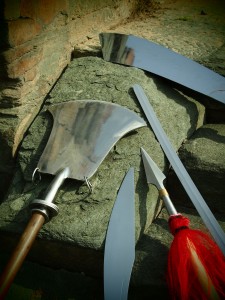 A few weeks ago my class finished learning Dadao (literally “big knife,” dadao is a blade on the end of a staff) and crossed a small threshold in our training. Dadao was the last form in our curriculum. While checking forms off of a list is by no means a meaningful way of measuring a martial arts education, I think we all felt it was a notable accomplishment. And more than that, it is one of the first of our “lasts”. As the months tick away to our “graduation,” we will pass more of these milestones until the day comes when we have to leave this place that has become our home.
A few weeks ago my class finished learning Dadao (literally “big knife,” dadao is a blade on the end of a staff) and crossed a small threshold in our training. Dadao was the last form in our curriculum. While checking forms off of a list is by no means a meaningful way of measuring a martial arts education, I think we all felt it was a notable accomplishment. And more than that, it is one of the first of our “lasts”. As the months tick away to our “graduation,” we will pass more of these milestones until the day comes when we have to leave this place that has become our home.
There is a quotation by everyone’s favorite kungfu practitioner, Bruce Lee. “I fear not the man who has practiced 10,000 kicks once, but I fear the man who had practiced one kick 10,000 times.” Thinking this way, I used to resist learning new forms. I wanted to practice the forms I knew until I felt really good at them. I will just say, Bruce Lee was absolutely right, but I was wrong.
For one thing, I drastically underestimated the number of hours of training that make up five years. Without dogmatically limiting myself, there has still been time enough to do each and every form I know many, many, many more times than is comfortable.
Second, each of these forms is a teacher in itself, and even if I can’t claim to have mastered even one of them, each influences me and molds me. The longfist forms teach me extension. Dragon teaches me body technique. Taiji teaches me balance and focus. Sword teaches me coordination beyond my limbs, and monk spade strengthens and stabilizes my stances. I can’t stay in Wudang forever, and these teachers are ones I can take with me when I go.
It was also ridiculous of me to think I would ever feel that I was “good” at any of these forms. We improve and progress, but each step up the ladder just lets you see how much further the ladder goes. If I waited to “master” the basic fist before doing anything else, I would still be practicing it and I would have missed out on all the richness of the other forms.
I am sure that, had I stuck with the basic fist form for five years, I would be pretty impressive at it. But I also think I would have been limited. Remember my blog about cultural blind spots? There are all kinds of blind spots. Learning a new form — learning a different type of movement — forces you to step back and return to a neutral, receptive learning space. If I had just worked on basic fist, I ‘d have worn myself deeper and deeper into a rut, so sure that I understood the bounds of kungfu, even if I had not yet reached them. Taken together, the forms became a cohesive practice that broke me free of some of my limitations.
These forms are a part of me now, I guess. And so, even if learning the last of them marks the beginning of the end of my wonderful time in Wudang, maybe with their help my class and I will be able to take our art home with us, and someday be the kind of teachers who can pass on the deepest treasures of kungfu to the next generation.

Corey, I can relate to this post in that I can feel so confident in the understanding and execution of my forms, but that certainly doesn’t mean that I’ll do them perfectly each time. Even after doing them over 1,000 times, which is the point at which you really start knowing them (per Master Tom Callas) – I wonder if I’ve done any that often yet, I must count up(!).
Yesterday while looking over videos of my bo dan test for the first time, I could see were the mistakes in my forms – during the demonstration, when they were to be at their apogee of perfection! I can still recall most of my errors from the demonstration and, joy of joys, now I got to relive them, in full video color! My original emotion was disappointment at seeing them, feeling like I let myself and my instructor and my school down.
But as humans, this is what we’re working on (or should be): perfecting our skills and learning from our mistakes and moving forward. Our ladders can get mighty long, can’t they! I have previously performed any one of those nine forms from my bo dan test much better, and certainly much worse. Just like my other daily routines of existence – being a husband, a father, a son, a colleague at work – which I will do well or poorly on any given day. If the general trend is in the direction of “well”, then I guess I must be doing something right.
If studying the martial arts doesn’t help teach us about patience, discipline, and perseverance, then why are we doing it?